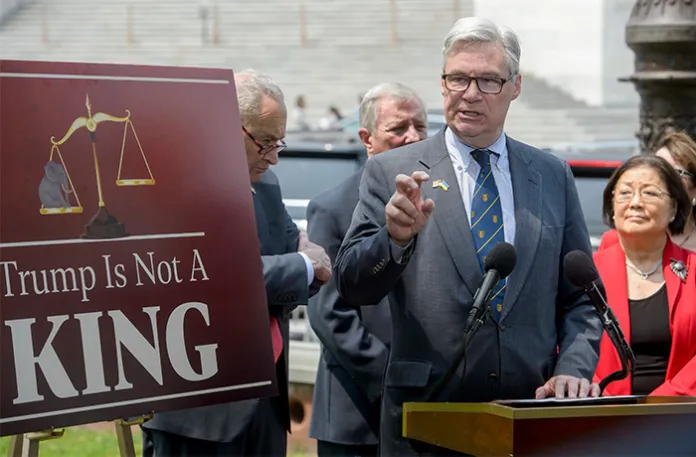When Ghislaine Maxwell was transferred to a minimum security facility in early August, Sen. Sheldon Whitehouse (D-RI) wanted to know why.
Roughly one week after meetings with Deputy Attorney General Todd Blanche, Maxwell was “suddenly transferred from a low-security facility in Tallahassee, Florida, to a minimum-security prison camp in Bryan, Texas,” Whitehouse wrote in a letter to Federal Bureau of Prisons Director William K. Marshall.
The transfer raised some red flags for the senator, who sits on the Senate Judiciary Committee. Maxwell is famously serving a “20-year sentence for participation in a scheme with [the late Jeffrey] Epstein to traffic and sexually exploit minors,” he wrote, and the FBP’s own guidelines counsel against allowing such inmates in minimum-security lockup.

Was a waiver granted to allow for the transfer? If so, who granted it? Was this “special treatment in exchange for political favors,” as President Donald Trump comes under increasing pressure to release all of the government files related to Epstein? Whitehouse demanded a slew of documents to “assist with my inquiry into the propriety of Ms. Maxwell’s transfer.”
In many ways, this was par for the course for the senator from our nation’s geographically smallest state. He is frequently a thorn in the side of Trump and his administration. In the last few months alone, Whitehouse has:
- Withheld unanimous consent and thus slowed the confirmation of Sean McMaster’s nomination to lead the Federal Highway Administration
- Denounced the vote to confirm Emil Bove, a former Trump Justice Department official, as a federal judge on the U.S. Court of Appeals for the D.C. Circuit
- Written a letter to the D.C. Circuit asking the chief judge to “look into an extraordinarily long administrative stay that blocked an investigation of Emil Bove and other Department of Justice lawyers’ potential contempt of court.”
First elected to the Senate in the anti-Iraq War Democratic wave election of 2006, Whitehouse won his latest reelection last November, with almost 60% of the vote. Before that, in Rhode Island, he served as an appointed United States Attorney under President Bill Clinton and then ran successfully for state attorney general.
Whitehouse’s politics are those of a standard-issue progressive Democrat from the East Coast. The League of Conservation Voters gives him a 98% lifetime score. The AFL-CIO tops that with 99%. Conversely, Heritage Action gives him a lifetime score of 3%.
His politics may explain Whitehouse’s general opposition to the current occupant of the White House, though not necessarily the invective. He has called Trump “a nincompoop with a child’s fragile ego,” an appeaser, and a chump. He frequently calls Trump officials liars and thugs. His reaction appears to be as much visceral as political. Why?
Whitehouse, 69, with a full head of white hair, is a government man through and through who views Trump officials as something like an invading army. He has described himself as the “son, grandson, and nephew of Foreign Service Officers” and has the sort of schooling that goes along with his pedigree: undergrad at Yale and law degree from the University of Virginia.
He is still the junior senator from his state, and that is likely to persist for some time. The state’s senior senator, Jack Reed, is 75 and running for reelection next year. Similarly, Whitehouse is not yet the ranking member of the Senate Judiciary Committee, a title that tends to correspond, roughly, to tenure. That honor belongs to Sen. Dick Durbin (D-IL), 80, who is retiring after next year’s midterm elections.
If Whitehouse’s party manages to run the table in those elections, Democrats could take back the Senate. There’s a good chance Whitehouse would be the chairman of the Judiciary Committee. If the past is prologue, America could then expect plenty of investigations and highly contentious hearings for Trump-nominated Justice Department officials and other judges.
Whether or not he could be effective in that role is another question. Whitehouse has been missing in action at times when it mattered, not just to his party but to the country as a whole. He angered Democrats by missing an important vote in April that would have put a majority of senators on record as being against Trump’s tariffs, for instance.
His social media-fueled judgment could be another issue. “Russiagate,” the conspiracy theory that Trump became president in 2016 because of Russian election interference in his favor and with his cooperation, has been pretty thoroughly proven false. Yet Whitehouse continues to push that line.
THE CARJACKING HEARD ROUND THE WORLD
“The word ‘hoax’ for Donald Trump is like a poker tell,” Whitehouse said in a recent video on social media. “It’s his way of basically admitting that something is true. So, Trump/Russia, he calls it a hoax.” He then lumped that actual hoax with global warming and the Epstein files.
Those words were meant as an applause line. And many Democrats, who polls indicate still believe in Russiagate in significant numbers, likely clapped. Yet the effect on credible persuasion of other Americans is statistically limited. Trump is never shy of responding to criticism that is damaging to him from any source. It could be telling that he has mostly passed over Whitehouse’s barbs in silence.
Jeremy Lott is the author of several books, most recently The Three Feral Pigs and the Vegan Wolf.
